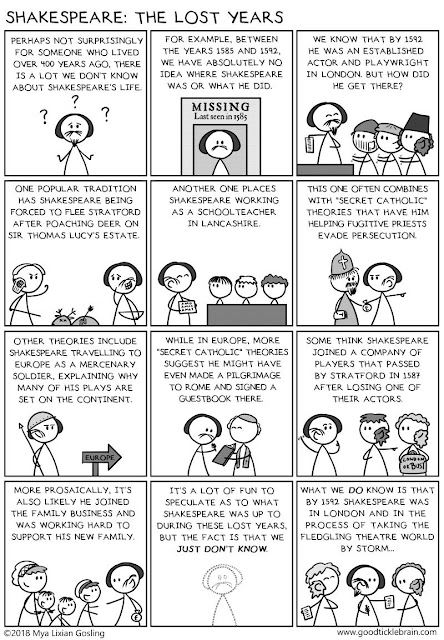EMMAUS PLOT ECHOES IN SHAKESPEARE When Jesus appears to two disciples on the road to Emmaus, was this a resuscitated corpse using super-powers, or just cleverness, to go unrecognized? Or was it not a resuscitated corpse at all? If we assume Jesus supernaturally altered his appearance, might we look for a plot echo in Bottom, altered by fairies in Midsummer Night's Dream? If we assume Jesus clouded the minds of the disciples, might we try magical characters, such as Prospero in The Tempest? Or better: If we think Jesus wore a white hood for shade and a cloth wrap to keep desert dust from nose and mouth, we might look for disguise: In Merchant of Venice, like two disciples, Bassanio & Gratiano fail to recognize Portia as the lawyer who “became man” to save their friend. What if a mere stranger did for two disciples the kinds of things Jesus had done? Listening with empathy, explaining scriptures, breaking bread? What if they found in him similar stuff as they had found in...
Posts
Showing posts from April, 2018
THE GHOST OF JONAH HAUNTS SHAKESPEARE’S HAMLET
- Get link
- X
- Other Apps

Hamlet, upon hearing from the ghost that Claudius killed his father, says, “O, my prophetic soul!” —and so the playwright invites us to associate the prince with biblical prophets. Sure enough, the play names the player queen "Baptista," which calls to mind John the Baptist, a prophet who was executed for criticizing the incestuous marriage of the king. Later Hamlet is on a westbound ship, like Jonah, a biblical prophet who was called to be a prophet, but who learned the old adage, "you can run, but you cannot hide." In the Saxo Grammaticus source tale, Amleth (Hamlet) goes to England, marries a princess, returns. But Shakespeare cuts it short mid-sea: Hamlet gets swallowed (figuratively) by a pirate ship that brings him back east to Denmark. Hamlet’s ocean-motion echoes that of prophetic soul Jonah: Called to prophecy in Nineveh, he took a westbound boat to Tarshish to flee his fate. In a storm, Jonah was swallowed by a fish that returned him eastward where...
- Get link
- X
- Other Apps

Call For Papers: For the Sixteenth Century Society & Conference in Albuquerque, NM (1-4 Nov. 2018), I’ve proposed a panel on how biblical allusions (in many forms) influence our readings of particular Shakespeare plays. Too often, biblical allusions are treated like wallpaper in the plays. Robert Alter writes of how allusions are like windows to another text, opening up larger conversations. Short proposals for papers are welcome. Details below. Best to focus on the many forms of biblical allusions in a single play. (You need not have read any of the books mentioned in the panel description; you need only have an interest in spotting and considering biblical allusions in a Shakespeare play, and interpreting the play in light of them.) https://lnkd.in/ehGh2NQ Deadline extended to April 23 to submit proposals to SCSC; please use Panel Code: P02M1518 #Shakespeare #EnglishLiterature #EnglishLit #EarlyModern #16C #Renaissance #literature #theatre #theology #biblicalstudies ...
- Get link
- X
- Other Apps

Good Tickle Brain comic has a good summary of Shakespeare's lost years : image below, link to GTB post on Twitter https://goodticklebrain.com/home/2018/4/10/shakespeare-the-lost-years #shakespeare ~~~~~~~~~~~~~~~~~~~~~~~~~~~~~~~~~~~~~~~~~~~ Links to a description of my book project: On LinkedIn : https://lnkd.in/eJGBtqV On this blog : https://pauladrianfried.blogspot.com/2017/05/hamlets-bible-my-book-project-im.html [Originally posted around the week of 4/12/17 on LinkedIn ]
- Get link
- X
- Other Apps
JAMES SHAPIRO REVIEWS RHODRI LEWIS's "HAMLET & The VISION of DARKNESS" James Shapiro has a review of Rhodri Lewis's "Hamlet and the Vision of Darkness" in the New York Review of books . I follow Lewis on Twitter, have corresponded with him a bit, and am looking forward especially to his understanding of falconry terminology in Hamlet. Some other reviews have been less generous than Shapiro's, and I'm sure I may disagree with Lewis on a number of his conclusions; but a rich diversity of opinions, exploring and testing things that as yet may have gone untested, is essential if scholarly conversations are going to advance. This review is a helpful one to read in part because of how it offers a glimpse of the history of scholarly opinion on Hamlet, and how critical approaches to literature can also reflect the critic's relation to their own moment in history, necessarily including its political aspects. Highly recommended reading . https://...
Favorite experiences at SAA 2018 in Los Angeles
- Get link
- X
- Other Apps

Favorite experiences at SAA 2018 Some of my favorite experiences at the Shakespeare Association of America (SAA) conference in Los Angeles included meeting other attendees, either at seminars, or by chance. On the ride from the airport on Wednesday, I met Jim Schiffer of SUNY, who is working on the Twelfth Night variorum project, which may be published entirely online. There was also a wonderfully moderated seminar on "Thinking Theology with Shakespeare." Jay Zyck of UMass-Dartmouth did an excellent job, and the abstracts of the papers hinted at may more insights and riches. Auditors only experienced the tip of the iceberg. ~~~~~~~~~~~~ At #Shax2018 3:30 to 5:30 p.m. today, an amazing and most effectively moderated seminar. Jay was obviously very thorough in his reading of all the papers, noticed common themes, elicited good questions from all presenters beforehand, so they were all well-prepared. ~~~~~~~~~~~~ A common observation: "This was one of the best-mo...